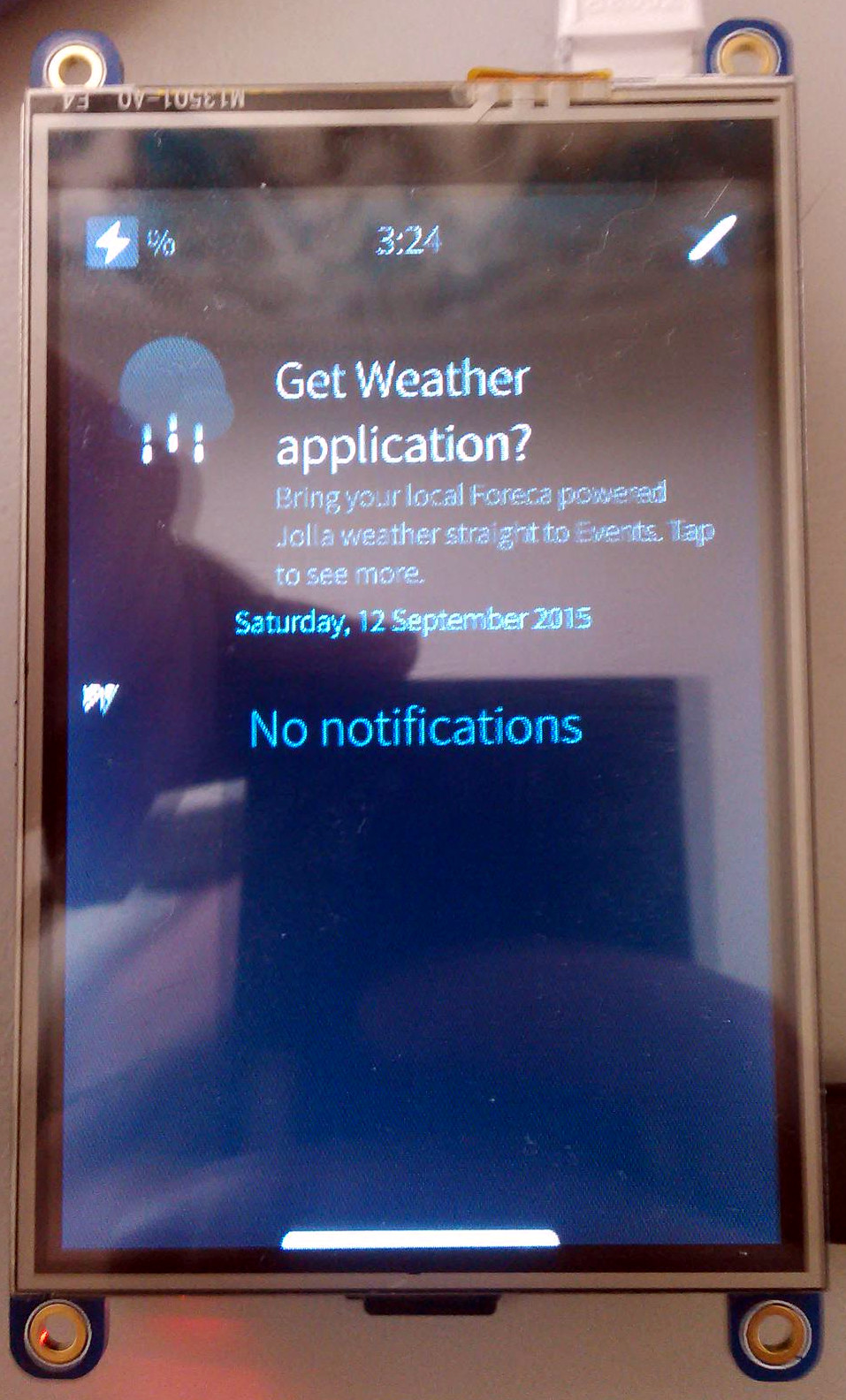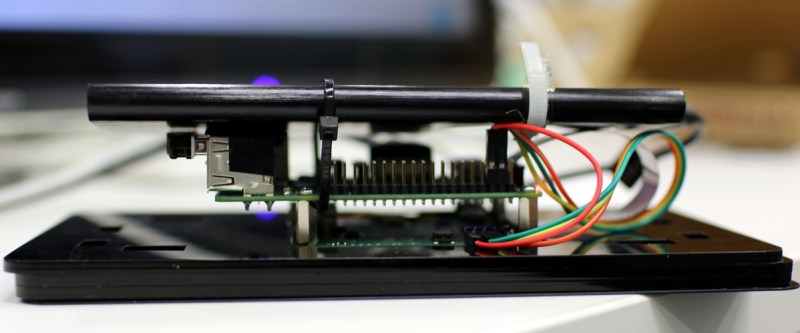There are so many hacks in this project it’s hard to know where to start. So let’s start at the SailPi tablet which is a Raspberry Pi running the Sailfish OS on an LCD touch screen powered by a cell phone battery pack. The design looks more like a high-tech sandwich with the Pi in the middle than a tablet. Despite the appearance it works, at that’s what counts.  The creator, [Aleksi Suomalainen] expended a lot of effort pulling all the pieces together on this project.
The creator, [Aleksi Suomalainen] expended a lot of effort pulling all the pieces together on this project.
The Sailfish OS project is targeted at creating a new OS for mobile devices, especially cell phones. It is open source which invites developers to contribute to the project. The touch screen user interface is designed for ease of use by gestures from one finger on the hand holding the phone.
[Aleksi] ported Sailfish to a Pi 2 during a hacking week. He’s shared the code for it on his blog. During the hack week he played with accessing the GPIO on the Pi to flash an LED. To get you up and running quickly he provided an image you can load onto an SD.
It appears the Pi is finding a niche for OS hackers in addition to the hardware hackers using the GPIO.
Don’t miss the demo after the break to see the OS running on the Pi.
















Wow, it is sad that Coke-Propane Rocket Blasts Off Without Ignition gets more views/posts than this article.
Bravo to Aleksi, looks like a cool project.
Nothing sad about it; entertainment-education > education.
Sorry mom said I can’t talk to strangers; unless I’m in a strange land…
Thanks! I’m looking forward on people using this on their projects, its wayland and all :)
What’s the point of Sailfish, exactly? We already have Android, and Ubuntu for smartphones, and that Firefox OS. Smartphone OSs are only useful when they have developers willing to write apps (and I mean GOOD apps, not just ports of a twenty-year-old KDE paint program or whatever) for them. Do they expect this to ever become something successful?
See, it’s a successor of MeeGo, which is a successor of Maemo, and both of these have assembled communities around themselves, especially given that they were mainly on Nokia phones – such as N900! IMO it’s assumed there won’t be a huge community but the devoted one. Also, they already have a phone and a tablet, and it sure must mean something =)
To me, Maemo (Sailfish’s predecessor) is like a modern day BeOS. Its a system that was way ahead of its time, but never gained the traction it deserved.
When the original iPhone was released, iOS had no App Store. The original intention was that all apps would be web based. There was also no multitasking ability and even simple things like copy/paste were not possible. Windows CE had some of these things, but a plethora of its own issues. At the same time, there was the Nokia N800/N810 running Maemo. It had a Debian based package manager and full desktop like multitasking abilities. It had both QT and GTK, so you could easily recompile regular desktop Linux apps to run on it. It also had a web browser based on Firefox, with Adobe Flash support. Lack of Flash was considered a severe deficiency for Safari on the iPhone at the time.
Even today, Android has very little in common with desktop Linux distributions, besides the kernel. Maemo was essentially Debian with a touchscreen desktop environment and a really nice open source ecosystem surrounding it.
> We already have Android, and Ubuntu for smartphones, and that Firefox OS.
And we had Amiga, BeOS, MorphOS, couple of less known *BSD, Solaris, some commercial unixes.
Why the smartphones should have a privilege to have only a few operating system running on them?
I have a Oneplus One with cyanogen OS, which is considered (by many) the best of what is possible in android world.
Still, I keep my eyes open for alternatives. I would buy an ubuntuphone or jolla if it would come with a comparable *hardware*.
I’m not at all impressed by Android system, I hate developing for it, it will always feel alien to me.
I’m home in a linux system, I do not feel home in android and I hate all its restrictions (everything comes through a google service).
I hope a truly linux based system on a phone will grow to the point where it can not be ignored anymore.
Yep, plus Google and Apple all have dodgy agendas for data and usage capture – be it for simple ‘harmless’ advertisement and market targeting, or outright privacy violation. Plus they have ‘history’ with state security and surveillance authorities.
I for one welcome our new smartphone OS writers if privacy is even slightly honoured.
I feel better on linux too. Most apps could have been replaced by a bash script…
Android is truely Linux based. But Linux is only a Kernel, the rest is the GNU OS.
You want the GNU OS.
Maybe if enough people learn the distinction we’ll be more effective at asking for it.
Quiet down Richard.
If he were Richard, he’d recommend Hurd as a far more superior alternative to Linux. ;)
IIRC there is almost no GNU stuff in Android. Certainly not on the phone itself, there is some in the SDK.
Why do people consider Cyanogen its own OS? Its a mod. Ubuntu is still Debian. Cyanogen is still Android.
> Why do people consider Cyanogen its own OS?
Don’t know why you think anybody said it is a separate OS.
“Cyanogen OS” is the official name, please see here:
https://cyngn.com/cyanogen-os
Not to be nosy, but Cyanogen OS is actually different from CyanogenMod. They’re both developed by Cyanogen, but CyanogenMod is fully free apart from some firmware, while Cyanogen OS is a more locked down proprietary product. Cyanogen has gone in league with Microsoft for their Cyanogen OS, so it’s not as good as CyanogenMod if you’re into free software!
Android is the worst possible platform for developing snappy software due to its Java dependency imposing huge latencies to applications. This is the reason why after years of development we cannot have professional realtime music applications on quad cores like iOS had since day one on much slower hardware.
iOS is a far better platform technically speaking, although Apple hostility to its users and developers calls for an alternative for it as well.
The more alternatives we have to Android and iOS, the better.
Start an indiegogo campaign. Maybe you ship it before the jolla tablets arrive. :-)
Also at hackaday.io: https://hackaday.io/project/8131-sailpi
Imagine how awesome this would be with a raspberry pi zero and a GSM usb dongle with the plastic cover removed… You can kind of achieve a smaller form factor with 3G internet and SMS and Calls capability (would just need some python and AT commands and all get’s together really smooth and easy